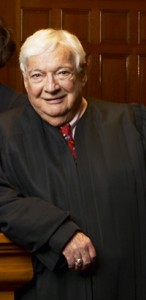 Judge John L. Coffey, a man of strong conviction and strong faith, was remembered for his positive impact on family, the courts, and the legal profession in a ceremony April 17 in the Appellate Courtroom of Eckstein Hall.
Judge John L. Coffey, a man of strong conviction and strong faith, was remembered for his positive impact on family, the courts, and the legal profession in a ceremony April 17 in the Appellate Courtroom of Eckstein Hall.
Nine judges of the United States Court of Appeals for the Seventh Circuit were on the bench at the ceremonial session in memory of Coffey, who died last November at 90. Chief Judge Frank H. Easterbrook said the location was appropriate because Coffey “thought the world of this school—this is where Jack Coffey would have wanted this celebration.” Coffey graduated from Marquette University in 1943 and from Marquette Law School in 1948 and was well known for his loyalty to Marquette.
Beginning in 1954, Coffey served as a judge in Milwaukee County, until he became a member of the Wisconsin Supreme Court in 1978. He joined the federal appeals court in 1982. In 2012, he announced he would not take part in cases—although, as was noted during the session, he didn’t really say he was retiring either.
“Jack did not see much ambiguity,” Easterbrook said. He described Coffey as a passionate advocate who once emphasized a written point he was making by underlining, bold-facing, and italicizing the passage. “He missed only the opportunity to put it in a larger font,” Easterbrook said.
Coffey was “a rock when it came to defending his principles,” Judge Rudolph T. Randa of the United States District Court for the Eastern District of Wisconsin told the audience of about 200.
Marquette Law School Dean Joseph D. Kearney said, “Jack Coffey focused relentlessly on the future,” including the future of the Law School. Coffey was one of the first alumni to encourage Kearney to consider leading the Law School out of Sensenbrenner Hall.
Francis Schmitz, who was a law clerk for Coffey in 1983-84, said that working for Coffey “was not unlike the parental concept known as tough love.” The judge was a demanding, no-excuses, no- cutting-corners boss who cared greatly and compassionately about those who worked for him, Schmitz said.
Peter Robbins, a grandson of the judge, said Coffey asked for divine guidance every day because he sat in judgment of others. He believed in hard work—“he always endeavored to know more”—but his family meant everything to him, Robbins said.
Coffey’s son, Peter Coffey, recounted how his father was one of ten children, all of whom graduated from Marquette.
Easterbrook said that Coffey had a reputation of being a dissenter, but during Coffey’s time on the federal appeals bench, there were 93 cases heard en banc and Coffey was in the majority in 78. He wrote the opinions in 11, which, Easterbrook said, was more than his share. “We miss his presence in our circles,” Easterbrook said.

This event sounds like a very fine tribute to a member of the MULS’ 1948 “class of judges.” Good job Marquette!